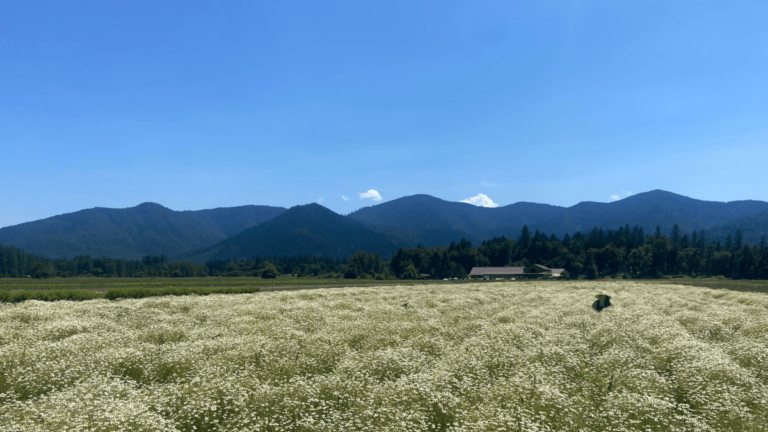Sourcing and purchasing high-quality, organic and sustainable herbs can feel like finding needles in haystacks, although this is paramount when creating effective herbal tinctures for a healthy lifestyle.
By visiting farms, harvesting together with wildcrafters or simply getting to know your herb suppliers, you ensure that our herbal products are made with high-quality and safe ingredients. Let’s tour one of WishGarden’s favorite organic farms and go behind the scenes of intentional sourcing!
In Applegate Valley, between the majestic Redwood Forest and Grant’s Pass, Pacific botanicals is an organic, regenerative farm that has been growing medicinal plants since 1979. Its founder, Mark Wheeler, began growing with an eye toward “being a good steward of the earth and its resources.” To this day, everyone who works at Pacific Botanicals continues to adhere to these core values and delivering high-quality herbs.
When I arrived at the farm, I drove down a narrow dirt road with large trees on my left and a body of water on my right. Around the corner I found myself between two barn-like buildings and a large field of lemon balm. The heady citrus aroma filled the air as farm workers harvested this favorite of the mint family. I thought to myself, this is going to be a great day.
Biological agriculture
Fields of medicinal flowers and trees cover Pacific Botanical’s farmland, inviting all kinds of wildlife and pollinators. Bees and butterflies fluttered over bright pink Echinacea purpurea flowers as Nate Brennan, purchasing manager, led the tour of the farm. When we arrived under several mature lime trees, he explained how the trees vibrate with bees when their white flowers are in bloom. The flowers were at the end of their blooming stage, but I could feel a slight buzzing sensation of lingering bees and a sweet floral scent. “We like to leave blooming flowers alone for a week or two before harvesting so the pollinators can have their turn,” says Nate. After harvesting the plants, the drying process begins within 15-20 minutes to ensure optimal components are captured and preserved for storage and shipping.

WishGarden’s purchasing manager Lauren Nichols and Pacific Botanicals’ purchasing manager Nate Brennan in a field of lemon balm and echinacea.
During the day I learned about their unique farming methods and practices. They weeded by hand and planted deliberately Avena sativa over red clover to retain soil and build biomass. Most importantly, all farm workers practice ROC, or Regenerative Organic Certificationdemands by treating the soil of the land as a living organism.
Insightful agriculture
In addition to Nate’s tour of the farm, I had the privilege of speaking with Pacific Botanical’s director of agriculture, Matt Dybala. He walked me through every season on the farm, from starting spring seeds to harvesting fall roots, paying close attention to the dirt where our plant friends thrive. “Every year is different,” says Matt as he explains the start of the planting season. “Memorial Day marks the beginning of the planting season.”
Pacific’s specialized mechanical equipment allows them to plant in straight rows; As the machine opens the soil, the farmer drops the seed or plant into place and then covers it. With this type of effectiveness you can plant several hectares per day!
Pacific Botanicals goes beyond its extensive sustainable certification collection and analyzes farmland through laboratory testing. They believe that microorganism populations, water retention, protein content and nitrogen ultimately influence a plant’s medicinal value and crop yields. Furthermore, soil health has a direct impact on our health when we make products for consumption from cultivated plants. Pacific Botanical’s biodiverse farm produces powerful, highly medicinal herbs, which is why WishGarden considers them a top supplier!

Organic Chamomile. Smells so sweet!
Support your farmer!
Buying organically grown herbs has never been as difficult as it is today. Our food and herbal supply chains look very different as we have to worry about pesticides, pollution and bad intentions creeping into our food and supplements. What is the solution? Support your local organic and regenerative farmers by visiting farmers markets, buying local, and purchasing herbal tinctures from companies that can responsibly trace their finished product from soil to shelf.
Lauren Ann Nichols-Sheffler attended the Colorado School of Clinical Herbalism and received her certification in Medical Herbalism. She owns it Blue yarrow herbs also known as Herbal Vice, an herbal product company that practices bioregional herbal medicine by growing plants and sourcing locally. Lauren loves educating and advocating for plant sustainability. She is the purchasing and sourcing manager for WishGarden Herbs.
For educational purposes only. This information has not been evaluated by the Food and Drug Administration. This information is not intended to diagnose, treat, cure, or prevent any disease, or to sell any product.
Read further

